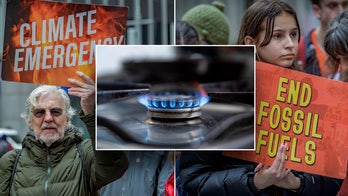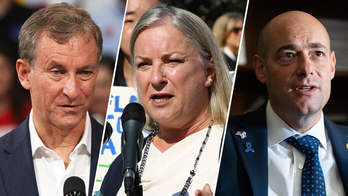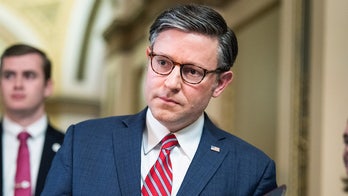President Obama defensive over high gas prices
Will energy costs prove pivotal in race for White House?
Mitt Romney is seizing on record-high gas prices in California to spotlight what he considers President Obama’s failed energy policies that have led to prices at the pump doubling over the past four years.
Romney has throughout his campaign promised voters an energy policy drastically different from Obama’s that would focus on the production on domestic energy to help the U.S. ends its dependency on foreign oil.
He continued with the message this weekend, repeating at a rally Saturday in Ohio that energy production tops his often-touted five-point, economic-recovery plan.
At a rally in Virginia a day earlier, Romney said: “Gas is at twice the price as when (Obama) came in. He cut in half permits for drilling. He said no to the Keystone Pipeline.”
Gas prices reached a record high last week in parts of California – as much as $4.671 a gallon.
The recent surge has been blamed on supply disruptions at refineries throughout the state.
But gas prices are an ongoing concern. And the Romney campaign is circulating a three-page memo detailing the candidate’s plan to boost domestic oil production in large part by approving the Keystone XL pipeline, which would run from Canada to U.S. refineries in Texas, and opening up more areas for offshore oil drilling -- including the mid-Atlantic where it is now banned.
The president has yet to approve construction of the pipeline and has rejected the concept that it would lower gas prices.
“You just tell (people) that anybody who suggests that somehow we’re suppressing domestic oil production isn’t paying attention,” Obama said at a rally in March in Cushing, Okla. “What you also need to tell them is anybody who says that just drilling more gas and more oil by itself will bring down gas prices tomorrow or the next day or even next year, they’re also not paying attention. … producing more oil at home isn’t enough by itself to bring gas prices down.”
Though Obama has repeatedly said he favors an “all-of-the above strategy” on producing domestic energy, critics say he has focused too much on alternative projects such as wind and solar -- which have yet to produce energy at market competitive prices -- while over-regulating domestic energy like coal and natural gas.
“President Obama has doubled fuel efficiency standards so our cars and trucks will go farther on a gallon of gas, helped double our production of job-creating clean wind and solar energies, and championed an all-of-the-above American energy strategy," Obama campaign spokesman Adam Fetcher said Sunday.
Fetcher argued the administration has opened millions of federal acres to oil and gas development, oil production is now at 14-year high, natural gas production is at an all-time high and the country is less dependent on foreign oil than at any time in two decades.
“Mitt Romney's so-called energy plan is devoid of any policy specifics or concrete steps that would realistically increase our nation’s energy independence," he said. "Instead, Romney’s policies would take us backward. He wants to keep giving billions of dollars in tax subsidies to the big oil and gas companies and recklessly open new sensitive areas for drilling, but turn our back on increasing energy efficiency and developing our clean, homegrown energy sources."
The memo by Romney policy director Lanhee Chen also argues the administration -- through the EPA and at least a dozen other agencies -- has stepped in to regulated states’ efforts to mine petroleum and natural gas through the process known as hydraulic fracking.
“Gas prices will be lower under President Romney than they will under a second term of President Obama,” Chen writes. “For middle-class families struggling to fill up the car and for small businesses struggling to meet payroll every month, the choice is clear.”
Obama ordered the release of 30 million barrels of crude from the country’s Strategic Petroleum Reserve in July, the start of the vacation-travel season.
The move marked only the third such time reserves have been released since established roughly 36 years ago.
A White House spokesman told Politico the release did not contradict the president’s position that short-term fixes will not solve the country’s long-term energy problems and said the move was simply to immediately fix to an ongoing supply disruption.
The president has not mentioned since then a similar release to correct recent price increases.





